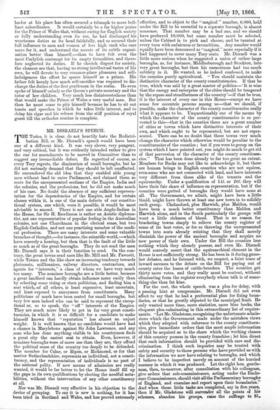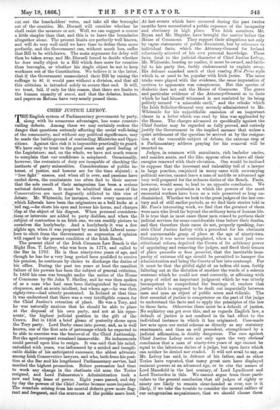MR. DISRAELI'S SPEECH.
THE Tories, it is clear, do not heartily hate the Redistri- bution Bill, or Mr. Disraeli's speech would have been one of a different kind. It was very clever, very pungent, and very critical, but it was evidently intended rather to give the cue for amendments to be moved in Committee than to suggest any irremediable defect. He regretted of course, as every Tory regrets, the diminution of small boroughs, but he did not seriously demand that they should be left unaffected. He surrendered the old idea that they enabled able young men without land to enter Parliament, and claimed them as seats for the unrepresented sections of the Empire, India and the colonies, and the professions, but he did not make much of his case. No doubt the absence of any sufficient represen- tation for the dependencies of the Empire, and for certain classes within it, is one of the main defects of our constitu- tional system, one which, were it possible, it would be most advisable to amend. There is not one able Anglo-Indian in the House, for Sir H. Rawlinson is rather an Asiatic diploma- tist, not one representative of popular feeling in the Australian colonies, not one Churchman in the clerical sense, but two English Catholics, and not one practising member of the medi- cal profession. There are many interests and some valuable branches of thought,—for instance, the scientific world, —which have scarcely a hearing, but then that is the fault of the little as much as of the great boroughs. They do not send the men Mr. Disraeli says it is their function to send. On the con- trary, the great towns send men like Mr. mill and Mr. Fawcett, while Totnes and the like show an increasing tendency towards plutocrats, millionaires, railway directors, contractors, and agents for "interests," a class of whom we have very much too many. The nominee boroughs are a little better, because a great landlord can hardly obtain influence more easily than by selecting some rising or risen politician, and finding him a seat which, .of all others, is least expensive, least uncertain, and least exposed to annoyance from constituents. Many politicians of mark have been seated for small boroughs, but very few men indeed who can be said to represent the excep- tional or, so to speak, the " off " interests of the Empire. They are much more likely to get in for very great consti- tuencies, in which it is so difficult for a candidate to make himself known that " reputation " has almost an unjust weight. It is well known that no candidate would have had a chance in Marylebone against Sir John Lawrence, and any man who has done anything visible to his countrymen finds a great city the easiest seat to obtain. Even, however, if nominee boroughs were of more use than they are, they offend the political sense of the country too deeply to be defended. The member for Caine, or Ripon, or Richmond, or for that matter Sutherlandshire, represents an individual, not a consti- tuency, and the representation of individuals is no part of the national polity. If new means of admission are really wanted, it would be far better to let the House itself fill up the gaps in its own qualifications by electing the needful nota- bilities, without the intervention of any other constituency at alL Nor was Mr. Disraeli very effective in his objection to the device of grouping. To say it is new is nothing, for it has been tried in Scotland and Wales, and has proved extremely effective, and to object to the "magical" number, 8,000, hea under the Bill to be essential to a separate borough, is almost nonsense. That number may be a bad one, and we should have preferred 10,000, but some number must be selected, unless the Cabinet is to pick and choose, and be taunted at every turn with unfairness or favouritism. Any number would equally have been denounced as "magical," more especially if it had happened to cover many Tory seats. Mr. Disraeli was a, little more serious when he suggested a union of rather large boroughs, as, for instance, Middlesborough and Stockton, into, very great boroughs, but then his earnestness had too much subtlety in it. He wanted, as he indeed confessed, to make the counties purely agricultural. "You should maintain the- distinctive character of the county constitutencies. If that be true, which was said by a great master of politics—' It is wise that the energy and enterprise of the cities should be tempered by the repose and. steadfastness of the country'—if that be true, it is the interest of every one in this House—except we have some few eccentric persons among us—that we should, if possible, make the character of the county constituencies really what it appears to be. Unquestionably one of the means by which the character of the county constituencies is so per- verted is this—that in the counties there are a great number of cities or towns which have distinctive interests of their own, and which ought to be represented, but are not repre- sented. There can be no doubt that these towns very much change the character which otherwise would be peculiar to the- constituencies of the counties ; but if you were to group on the system which I have pointed out, you might do much to get rid of that perversion of the character of the county constituen-- cies." That has been done already to far too great an extent. Members for Bucks may not like to acknowledge it, but there are human beings in English counties who are not squires, even some who are not connected with land, and have interests- very different from those alike of the tenants and the squirearchy. Under a qualification of 14/. or 20/. they will have their fair share of influence on representation, but if the counties were gutted of boroughs they would have none at all. The Government, we admit, might have been a little- timid, might have thrown at least one new town in to solidify each group. Chelmsford, plus Harwich, plus Mahlon, would have been a much better constituency than Maldon and. Harwich alone, and in the South particularly the groups will want a little richness of blood. That is no reason for bracketing towns simply to relieve the county register of some of its best votes, or for so throwing the unrepresented towns into seats already existing that they shall merely diminish the power of the ancient boroughs and acquire no new power of their own. Under the Bill the counties lose nothing which they already possess, and even Mr. Disraeli would scarcely assert that the squirearchical element in the House is not sufficiently strong. He has been in it during game- law debates, and he listened with, we suspect, a faint trace of inward sarcasm to the debate on the Bill for paying out of county rates the losses of cattle-breeders. The counties get thirty more votes, and they really must be content, without eliminating from the register everybody whose talk is of some- thing else than fat kine. For the rest, the whole speech was a plea for delay, with a passing hint at compromise. Mr. Disraeli did not even affect to say that he had a preferential plan for fixing boim-- daries, or that he greatly objected to the municipal limit. He only wanted more time, more statistics, more blue books, the' eloquent plea culminating in this extraordinary list of require- ments. "Let Mr. Gladstone, recognizing the unfortunate admis- sions which the Government made under the mistaken views. which they adopted with reference to the county constituen- cies, give immediate orders that the most ample information should be acquired as to the share which the working classes.
of this country possess in the county franchise ; let him direct that such information should be provided with care and clis- crimination. I think such inquiries may be trusted with safety and security to those persons who have provided us with the information we now have relating to boroughs, and which I believe to be imperfect merely on account of the hurried manner in which it was produced. Let the right hon. gentle- man, then, to-morrow, after consultation with his colleagues, give orders that sub-commissioners, acting under the Enclo- sure Commissioners, should visit all the ParTinmAntary boroughs, of England, and examine and report upon their boundaries." And when those little tasks are completed, say in five years, then if Mr. Gladstone will surrender all the points of his schemes, abandon his groups, raise the suffrage to 84. cut out the leaseholders' votes, and take all the boroughs out of the counties, Mr. Disraeli will consider whether he shall resist the measure or not. Well, we can suggest a course a little simpler than that, and this is to leave the boundaries altogether alone. The present limits are perfectly well known, and will do very well until we have time to define them more perfectly, and the Government can, without much loss, suffer that Bill to be withdrawn. The main argument for delay will than be taken away, and Mr. Disraeli forced to decide whether he does really object to a Bill which does more for counties than boroughs or whether his single object be not to keep workmen out of the Constitution. We believe it is the latter, that if the Government emasculated their Bill by raising the suffrage to 81. it would pass without a division, and that all this criticism is intended solely to secure that end. It will, we trust, fail, if only for this reason, that there are limits to the human capacity of ennui, and that the debates, leaders, and papers on Reform have very nearly passed them.































 Previous page
Previous page